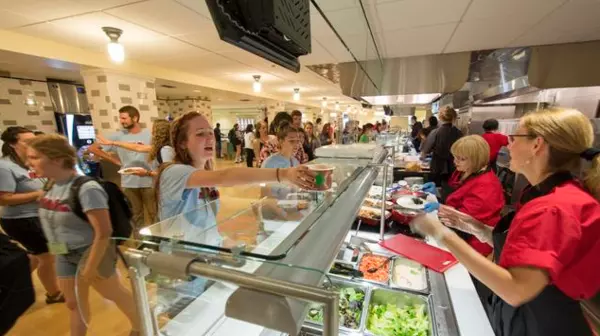Food Waste Reduction
Food waste is a major driver of climate change because of anaerobic decomposition on landfills, of which methane, a powerful greenhouse gas, is a byproduct. Reducing our kitchen’s food waste is a top sustainability priority for our kitchen team. Using the LeanPath food waste reduction system, Dining and Conference Services (DCS) was able to reduce the total food waste produced in the 2016 school year by over 10,000 pounds.
Tip: Do you usually finish your servings? If not, ask for less—or bring a reusable container and save some for later!
Reusable dishes
To reduce waste, the Diner serves food on reusable dishes unless you ask for paper. Reusable dishes should never be thrown away, and can be returned to the Diner at any time. Every semester, many reusable items go missing. Each missing item must be replaced by the diner—so please bring them back!
Through the Cup Karma program, campus community members are encouraged to bring reusable mugs to campus dining locations. Last year, we were able to save over 46,000 plastic/paper cups in our campus cafés. Simple daily habits can make a big impact!
Tip: Bring your own cup or mug and get a discount at campus dining locations.
Locally sourced food
The Diner supports local farming as well as companies that make sustainability a priority. The Diner partners with many local businesses and farms to aid in achieving that goal.
Meatless protein
It's true that eating less meat can help the environment. Livestock farming requires a large amount of water to produce the cereals used as animal feed, as well as to maintain the farm on which they live. Meat production is also the leading cause of rainforest destruction and results in methane production by cattle. Learn more at USGS Water Science School or EOS.
Tip: Meatless forms of protein, such as tofu, beans, nuts, and quinoa, are available in many dishes at the Diner.
Food justice means that a community exercises their right to grow, sell, and/or eat healthy food. It relies on sustainable food sourcing, as well as increased access to affordable and nutritious meals.
Food Salvage: The Diner collaborates in programs such as Food Salvage, which delivers food from the Diner to the Guadalupe House, a transitional house in downtown Tacoma. Interested in volunteering? Contact foodjustice@pugetsound.edu and join the team!
Dining Dollars Bank: Students experiencing food insecurity near the end of a term, and who do not have resources to refill their account, can request support from the Dining Dollars Bank Program. Students can donate Dining Dollars to students in need and leftover Dining Dollars from student accounts at the end of the academic year are automatically added to this bank. Contact the Dean of Students during the last four weeks of the semester for a request form.
Community Garden
The Puget Sound Garden is a space for individuals to come together to share a love of fresh, local food. Some food that is grown in the garden makes its way to the Diner to be served in meals. The garden is a way for students to get their hands dirty, learn sustainable gardening techniques, and enjoy the fruits of their labor.
The Garden Club utilizes the on-campus community garden space to learn about best garden practices, the importance of fresh, local foods, and how to build an engaging community that cares about the natural environment. For more information, contact garden@pugetsound.edu or visit our Facebook page.

